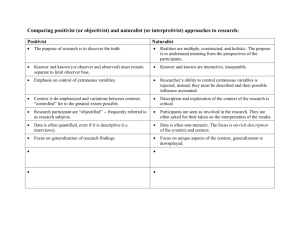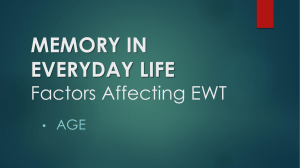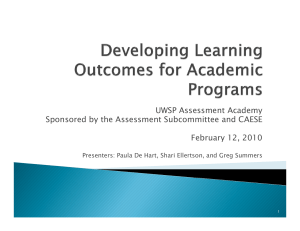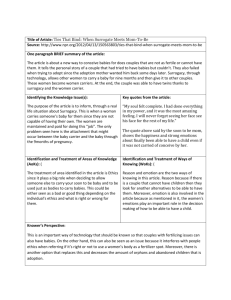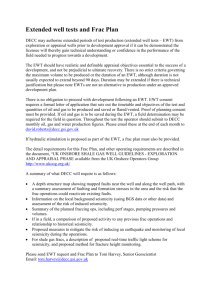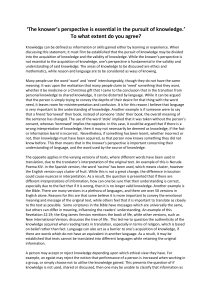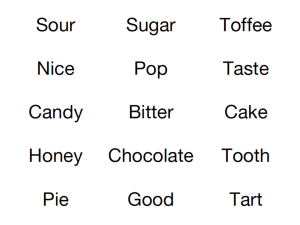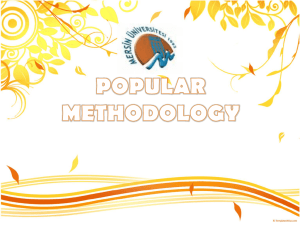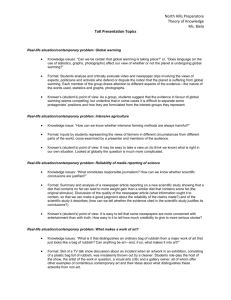The knower`s perspective is essential in the pursuit of knowledge.
advertisement
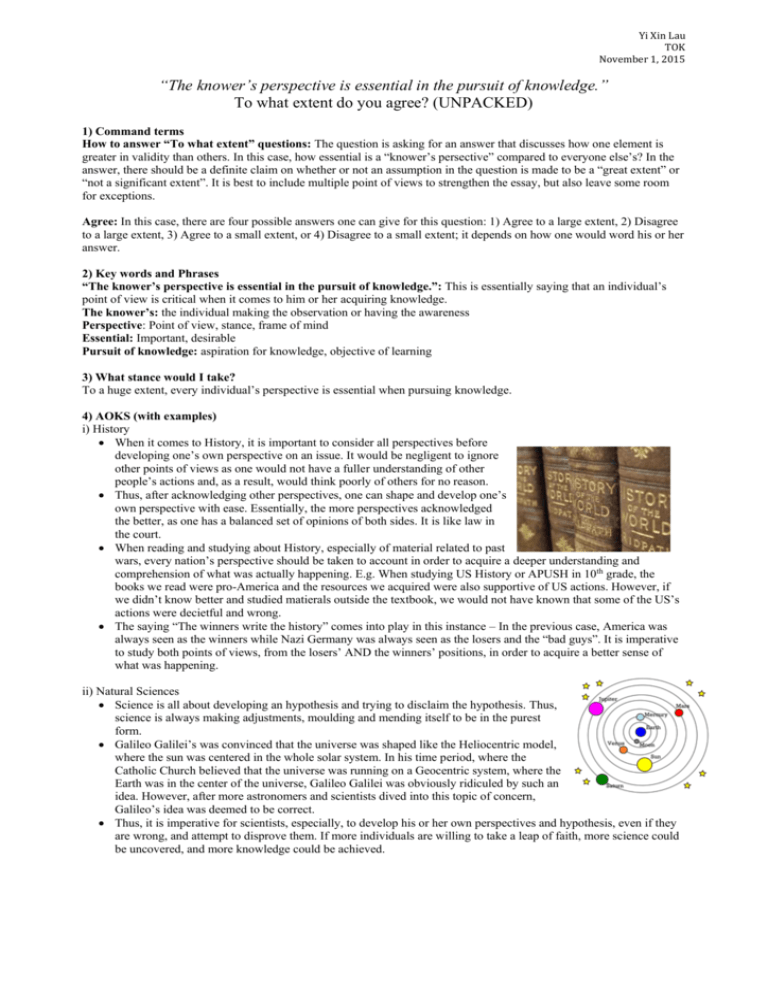
Yi Xin Lau TOK November 1, 2015 “The knower’s perspective is essential in the pursuit of knowledge.” To what extent do you agree? (UNPACKED) 1) Command terms How to answer “To what extent” questions: The question is asking for an answer that discusses how one element is greater in validity than others. In this case, how essential is a “knower’s persective” compared to everyone else’s? In the answer, there should be a definite claim on whether or not an assumption in the question is made to be a “great extent” or “not a significant extent”. It is best to include multiple point of views to strengthen the essay, but also leave some room for exceptions. Agree: In this case, there are four possible answers one can give for this question: 1) Agree to a large extent, 2) Disagree to a large extent, 3) Agree to a small extent, or 4) Disagree to a small extent; it depends on how one would word his or her answer. 2) Key words and Phrases “The knower’s perspective is essential in the pursuit of knowledge.”: This is essentially saying that an individual’s point of view is critical when it comes to him or her acquiring knowledge. The knower’s: the individual making the observation or having the awareness Perspective: Point of view, stance, frame of mind Essential: Important, desirable Pursuit of knowledge: aspiration for knowledge, objective of learning 3) What stance would I take? To a huge extent, every individual’s perspective is essential when pursuing knowledge. 4) AOKS (with examples) i) History When it comes to History, it is important to consider all perspectives before developing one’s own perspective on an issue. It would be negligent to ignore other points of views as one would not have a fuller understanding of other people’s actions and, as a result, would think poorly of others for no reason. Thus, after acknowledging other perspectives, one can shape and develop one’s own perspective with ease. Essentially, the more perspectives acknowledged the better, as one has a balanced set of opinions of both sides. It is like law in the court. When reading and studying about History, especially of material related to past wars, every nation’s perspective should be taken to account in order to acquire a deeper understanding and comprehension of what was actually happening. E.g. When studying US History or APUSH in 10th grade, the books we read were pro-America and the resources we acquired were also supportive of US actions. However, if we didn’t know better and studied matierals outside the textbook, we would not have known that some of the US’s actions were decietful and wrong. The saying “The winners write the history” comes into play in this instance – In the previous case, America was always seen as the winners while Nazi Germany was always seen as the losers and the “bad guys”. It is imperative to study both points of views, from the losers’ AND the winners’ positions, in order to acquire a better sense of what was happening. ii) Natural Sciences Science is all about developing an hypothesis and trying to disclaim the hypothesis. Thus, science is always making adjustments, moulding and mending itself to be in the purest form. Galileo Galilei’s was convinced that the universe was shaped like the Heliocentric model, where the sun was centered in the whole solar system. In his time period, where the Catholic Church believed that the universe was running on a Geocentric system, where the Earth was in the center of the universe, Galileo Galilei was obviously ridiculed by such an idea. However, after more astronomers and scientists dived into this topic of concern, Galileo’s idea was deemed to be correct. Thus, it is imperative for scientists, especially, to develop his or her own perspectives and hypothesis, even if they are wrong, and attempt to disprove them. If more individuals are willing to take a leap of faith, more science could be uncovered, and more knowledge could be achieved. Yi Xin Lau TOK November 1, 2015 5) WOKS (with examples) i) Sense Perception If someone is feeling certain illness symptoms, they would automatically assume that they are unwell. Symptoms can be felt both physically and mentally. Sense perception is the first thing that individuals identify before consulting a medical doctor. Therefore, a knower’s perspective is extremely essential when it comes to acquiring knowledge of one’s body condition. WedMD is a medical website that indicate the symptoms of each diesase and illness. Websites like this suggest that if an individual is percieving any of these signs, they should consult a medical advisor immediately. Acupuncture focuses on relieving tension and stress by inserting needles in stress relieving points on the body. Many individuals who undergo acupuncture confirm the effectiveness of this treatment. Additionally, it is believed that the more needles inserted into one’s body, the more pain relief one will feel. ii) Imagination When we were young, our parents believed that a child’s imagination was the purest and most innocent form of children. We believed in fairy tales and stories, which we eventually grew up to reject. It was from our imagination that we learned the ability to create one’s own ideas. Every innovator and inventor had an imagination. They all looked at an instance, wished that there was one way to improve the circumstances and thought of an idea. After acquiring this idea, they brought the idea to reality, gaining and achieving knowledge throughout the whole formation process. Thus, an individual’s perspective and imagination is important when it comes to knowledge. The Wright Brothers imagined that one day, they would have the ability to fly. With this desire and dream in their minds, they crafted the first ever aircraft that would soon evolve into one of the most appreciated transporation used in present day. 3D modelling is a relatively raw and new concept. Now, when having access to 3D printers, individuals from all over the world can combine imagination with math and create something entirely new. They would be achieving knowledge throughout the way as well. 3D printing can help solve the worlds’ greatest problems, such as medical problems and sport injuries. Imagination allows us to stumble across new conclusions that were never thought of before. We use it to solve world problems and crisis. 6) Knowledge issues To what extent does does language influence the retelling of history, and thus one’s own perception of past events? What role does culture bias play in one’s goal of achieving knowledge? 8) Assumptions When using these WOKs and AOKs as evidence and backup, this is automatically assuming that the knower has the initial intention of gaining knowledge and information. The knower is ethusaistic about learning and exemplifies the will to be wrong and to learn. 9) Counter Claims i) Memory and Eye Witness Testimony EWT is a system used presently by law enforcements and police. Essentially, individuals at the scene of a crime are brought in to describe the crime and give in their input. Essentially, the idea behind EWT is that memory from the eyewitnesses can help identify criminals or description of crimes that will overall be beneficial for the police and courts. The eye witness’ perspective is important when trying to piece together a puzzling crime. EWT is argued be both effective and ineffective. Loftus and Palmer argue that questions leading up to the answer can distort one’s schema and eventual recall of the memory. EWT is very risky in that the possibility of being wrong in a EWT may have a detrimental domino effect. People who were wrongly convicted of a crime will suffer consequences that they do not deserve. On the other hand, Yuille and Cutshall argue against the previous study mentioned, suggesting that EWT is effective and accurate. They concluded that misleading questions had little effect on the eyewitnesses. 10) Implications for the stance taken Every individual is equal in society. Thus, every perspective should be taken to account. Moreover, in school, we were taught to think for ourselves and to shape our own beliefs. Thus, having our own perspective is the first step of achieving knowledge.
